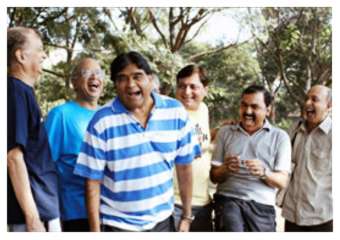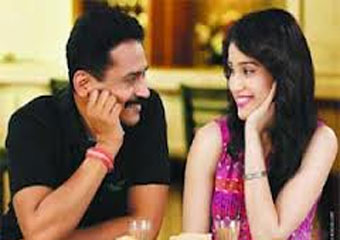“We are on….” is all about cricketainment
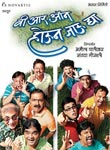 |
Rating: ★★★ ½
Banner: Maitra Entertainment Producer: Sandhya Gokhale Director: Amol Palekar Story – Screenplay: Sandhya Gokhale Dialogues: Sandhya Gokhale Cinematography:Amol Gole Cast: Ashok Saraf, Dilip Prabhavalkar, Ramesh Bhatkar, Manoj Joshi, Pushkar Shrotri, Upendra Limaye, Anand Ingale, Satish Pulekar, Vijay Kenkre, Satish Alekar, Ajit Kelkar, Shreeram Pendse, Sunil Godbole, Goutam Joglekar, Sameer Chougule, Sandeep Pathak, Nivedita Saraf, Vandana Gupte, Shilpa Navalkar, Suhasini Paranjape, Atisha Naik. Movie Review by: Ulhas Shirke |
Cricket has played a very important role in offering entertainment to people in India. And, if you are offering cricket in the form of entertainment through a feature film, it certainly invites the attention of film lovers. Films like ‘Lagaan’ and ‘Iqbal’ are the best examples. Now, at a time when IPL T20 Cricket fever is on, film maker Amol Palekar comes with a timely entertainment, through his new Marathi film ‘We are on, Houn Jau Dya’. Picking up popular veteran and young stars in the cast, Amol has cleverly managed to have two teams of cricket, to offer new form of cricketainment to Marathi film lovers.
Ideally set on the backdrop of Pune, known as the city of pensioners and at the same time the city of sports lovers; he has presented an altercation between the regular morning walkers and young enthusiastic cricket lovers; over the use of ground during the early morning hours. While the group of senior citizens complain about the nuisance caused by the youngsters, during the early morning hours; the youngsters, some of whom are their own family members, claim it as their right to play to relieve their stress, as they are otherwise working people.
The youngsters are keen to participate in the 25 lack prize money tournament at Nashik , as the only team from Pune; but, the seniors call it a craze for the game. To sort out the issue, finally it is decided to have a match between the youngsters and seniors, involving their well wishers, family members and also sponsors to watch the climax; which runs about 30-40 minutes towards the concluding part of the film.
Needless to mention that the seniors realising their limitations, use all the tactics possible, besides challenging the existing rules of the game. As a director Amol Palekar, having been influenced by his mentors Hrishida and Basuda, has sincerely paid tributes to his masters through this film. Through one of his main characters Andalkar (played by Makarand Anaspure) he has used almost the similar tactics during the cricket match, which he himself attempted as an actor, while playing a table tennis match against Asrani on the advice of his Guru Ashok Kumar in the film ‘Chotisi Baat’.
As a film maker, Amol Palekar has received good support from Sandhya Gokhale through screenplay and dialogues, for his own developed concept. In the pre interval session, we find every character and his family being introduced properly, through humour filled scenes. This entire session we find situation based comedy, with good support coming from versatile artistes like Dilip Prabhavalkar, Vandana Gupte, Ashok Saraf, Nivedita Saraf, Ramesh Bhatkar, Satish Alekar, Ajit kelkar, Shriram Pendse, Sameer Chougule, Manoj Joshi, Atisha Naik, Anand Ingale, Upendra Limaye, Pushkar Shrotri, Gautam Joglekar, Satish Pulekar, Sandeep Phatak, Shilpa Navalkar and others. Above all, you find surprise guest appearance by a famous former India Cricketer.
Dilip Prabhavalkar and Vandana Gupte in particular, have matched well as Ponkshe couple, still trying to look younger despite becoming grandparents. Ramesh Bhatkar as Retired Col. and Satish Pulekar as former Ranji Player, play their respective roles with a difference. Makarand Anaspure, finds himself in the company of senior citizens, playing their guiding force. It was nice to find Saraf couple together after a long time, playing so naturally ! Manoj Joshi as a Gujarathi friend in the group, plays the happy go lucky bachelor is style. Atisha Naik with Sameer Chougule succeed in creating laughter in few scenes. Among the youngsters, Anand Ingale and Sandeep Phatak are at their best. Pushkar Shrotri and Gautam Joglekar have almost underplayed their characters. But, it is Sandeep Phatak, who invites all the attention, with his flexible character.
Music does not have much scope in this film, except for one good musical song composed by Avinash Vishwajeet. The background music and sound effects have been used well. Cinematography by Amol Gole captures all the details of the celebrity cricket match very well. “We are on Houn Jau Dya’ is all about cricketainment. But, it’s a well presented timely film.
Fight of a common man against Violent ‘Yeda’
 |
Rating: ★★★
Banner: Maitra Entertainment Producer: Satish More, Sneha Tambe, Girish Salvi, Laxman Salunkhe, Aditya Sharma Director: Kishor Pandurang Belekar Story – Screenplay: Kishor Pandurang Belekar Dialogues: Girish Salwi Cinematography: Raees Ansari Cast: Ashutosh Rana, Reema Lagoo, Kishori Shahane, Satish Pulekar, Aniket Vishwasrao Movie Review by: Ulhas Shirke |
Director kishore Pandurang Belekar known for his debut Marathi horror film ‘Sa Sasucha’ and Asutosh Rana better known for his portrayal of dangerous characters in films like ‘Dushman’ and ‘Sanghrash’ have come together to offer new Marathi film ‘Yeda’, which is also debut film of Ashutosh Rana in Marathi. Therefore, this film had a special significance, knowing the capacity of these two people in their respective departments i.e. direction and acting. Moreover, the film having received ‘A’ certification of Censors, it was certainly expected to be horror filled film.
Set on the backdrop of a small town off Mumbai, the story of the film revolves around a psychic character of Appa Kulkarni ( Ashutosh Rana) who tortures his wife Savitri ( Kishori Shahane Vij) and wants his only young son Unmesh ( Aniket Vishwasrao), who is a Site Engineer, to marry a girl from wealthy family, so that he could recover all the expenses, he spent on his education. But, Unmesh who is in love with Pradnya( Pradnya Shastri) the only daughter of a postmaster from local Post office Mr. Vasant Narvekar( Satish Pulekar).
Knowing the dangerous nature of her husband, Savitri encourages her son to flee with Pradnya, suggesting him to take up another job at a new place. Pradnya gives a shock to her parents, as she flees with Unmesh, without taking them into confidence. Her mother Sadhana ( Reema Lagoo) feels more hurt. But, the psychic father of Unmesh doesn’t take this shock lightly. When Unmesh returns with his wife to seek the blessings of his kind hearted mother; Appa is almost on the verge of killing his own wife; who suggests her son to run away . Both manage to escape, as Appa follows them.
Appa is now after the blood of his own son and his daughter in law who is now pregnant. Violent Appa succeeds in his series of killings, targeting whoever comes in the way. Helpless Pradnya returns to her parents in that condition and finally delivers a baby boy; but breathes her last during delivery. The child is now in the custody of Vasant and Sadhana Narvekar; who are threatened by Appa to hand over the child. The entire post interval session is filled with mystery, as to what would be the next step of Appa and how Vasant Narvekar would face him. After face to face battle, Vasant escapes from the clutches of violent Appa in the climax, due to intervention of Police brought by his wife.
While he is overpowered by Police team, he warns Vasant that he would return soon to take back the child. And courageous Vasant dares to answer him back, stating that between him and his grandson, he would stand like a wall, to accept his challenge. In the climax scene, Vasant could have finished Appa in self defence; but it seems that the director had a sequel of this film in mind. The film which had held its grip over the screenplay for 130 minutes , therefore failed to satisfy the audience in the climax with an expected revenge, which was perhaps differed till part 2 of ‘Yeda’, as indicated through the concluding dialogue.
Technically, ‘Yeda’ is a well presented film by director Kishore Belekar , with good effective sound recording by Sanil P.K. and good support of location sound coming from Anil Nikam. Photography by Raees Ansari is very apt to the screenplay of this film. In the lead role Ashutosh Rana has really worked hard to present his dangerous character. He has received good support from versatile senior artistes like Satish Pulekatr, kishori Shahane and Reema Lagoo, who have performed equally well. In fact, it is a common man’s (Vasant Narvekar’s) courageous fight against violent ‘Yeda’ (Appa).
The young performers Aniket and Pradnya do not find much scope in this film; but, they have played their roles satisfactorily. Barring the violence part and not so convincing climax, ‘Yeda’ is otherwise a good creation.
Mrinal defines meaning of ‘love’ in her own style
 |
Rating: ★★★ ½
Banner: Bhupat Bodar Enterprises, Amol Production Producer: Praveen Thakkar, Director: Mrinal Kulkarni Story: Mrinal Kulkarni Screenplay: Manisha Korde Cinematography: Amalendu Choudhary Cast: Sachin Khedekar, Mrinal Kulkarni, Pallavi Joshi, Sunil Barve, Suhas Joshi, Mohan Agashe, Smita Talvalkar, Neha Joshi, Vidyadhar Joshi, Sidharth Chandekar. Movie Review by: Ulhas Shirke |
A marriage ceremony is usually a happy event. It’s only the living together with understanding in the post marriage period, is all that important to make the couple happy. Today, we hear about rising number of divorce cases, taking place soon after marriage or sometimes even after spending over 10-15 years together. In some cases, it is just a mutual consent between the couple keeping friendly relations, after their divorce; just to keep their children happy. But, does that make the children really happy?
In some cases, either the wife or the husband is away pursuing their career. Among today’s young lovers even before marriage, there are a few break ups. The new trend especially among girls is to postpone the marriage; till they find a suitable match. Till then, live-in-relationship is preferred by them.
In comparison, the people of old generation, who try their best to keep such aggrieved couples together, consider themselves lucky to find their suitable partner and living with them with perfect understanding, throughout their life. But, how is it affecting the young generation, comprising of children? How are they looking at marriage? This is what actress turned director Mrinal Kulkarni has tried to show through her latest released film ‘Prem Mhanje Prem Mhanje Prem Asata’.
Dr.Rohit Phadnis (Sachin Khedekar) is a reputed Doctor in Pune, running his OPD in his own bungalow. His career oriented Astro-Physicist wife Pradnya (Pallavi Joshi) has preferred to migrate to USA after divorcing her husband, leaving him in the company of two children. Living in the same area is Anushree (Mrinal Kulkarni) with her mother-in-law (Suhas Joshi) and two daughters Piya and Ria. Her husband Kedar (Sunil Barve) has deserted her for the past four years. Yet, Anushree’s mother-in-law having a soft corner towards her daughter-in-law, prefers to live with her, taking good care of her grand-daughters; while Anushree is busy running her own florist’s shop.
Dr.Rohit’s and Anu’s children are studying in the same school. One day, while Piya is injured during her basketball match in the school, she is attended by Dr.Rohit. And that incident brings both Rohit and Anu together. While Dr. Rohit still maintains good relationship with his ex-wife, like a good friend, regularly communicating over phone; Anu doesn’t want to see the face of her husband, who has deserted her. But, Kedar is regularly in touch with his daughters over phone, especially his elder daughter Piya (Asmita Joglekar).
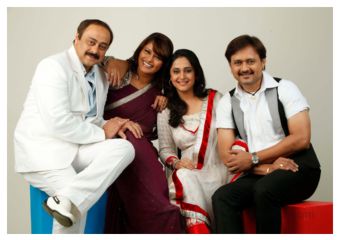
At a time when Dr.Rohit and Anu come closer; Kedar returns back home to drop his mother and daughters from a ceremony and so does Pradnya at Rohit’s place , to attend her brother’s wedding. The relationship between Dr.Rohit and Anu reaches a stage, where both of them have to take a crucial decision. Rohit is firm on his decision and suggests Anu to take her own decision; suggesting that he would always welcome her in his life. In the climax scene, Writer-Director Mrinal takes her bold decision.
As a debutant Director, Mrinal does have certain limitations; but, her sensible script and a desire to send across a strong message with the help of realistic characters helps her to make her presence felt, both as an actress and a director. However, the screenplay by Manisha Korde could have been much more interesting to create the desired impact through few important situations present in the script. She has managed well to take that sudden twist during the interval ; but barring that she has not used the shifts during important sequences skillfully. The wedding ceremony of Pradnya’s brother, has been used just namesake. Similarly, the character of Kedar hasn’t been highlighted much, to indicate the reason for deserting Anu. It is only the fine performances from the artistes, makes you ignore such minor lapses in screenplay.
As a director, Mrinal shows her concern for children who are witness to such estranged relationship of their parents. She clearly shows it through their emotions. At the same time, she shows the sufferings of a woman who has been deserted by her whimsical husband. In that climax scene, she literally stands up to speak up for all such women, who helplessly welcome their husbands back home, in spite of being deserted by them for years. In the same scene, she questions, whether a husband would welcome his wife with the same fervor, when his wife returns back home after staying away for years, deserting her family?
At the same time, she also shows an elderly couple, living with perfect understanding through the characters of her parents played by Mohan Agashe and Smita Talwalkar. Last but not the least, she has presented her younger sister’s ( Neha Joshi) character so perfectly, showing the trend of break ups between young couples even before marriage. In short, she has tried her best to define ‘love’ and its relevance to marriage in her own style. And that really makes this film a worth watch for all age groups.
Excellent photography by Amalendu Choudhary, good music, meaningful lyrics, sensible dialogues and above all, the wonderful performances by all the artistes, gives an artistic touch to this thought provoking film.
‘Aajcha Diwas Majha’ depicts clash of Ego with Conscience
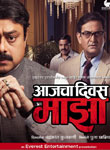 |
Rating: ★★★
Studio: Everest Entertainment, White Swan Producer: Puja Chhabria Director: Chandrakant Kulkarni Music: Ashok Patki, Mangesh Dhakde Cinematography: Rajan Kothari Cast: Sachin Khedekar, Ashwini Bhave, Mahesh Manjrekar, Pushkar Shrotri, Anand Ingle, Hrishikesh Joshi, Sunil Tawade, Bharat Ganeshpure Movie Review by: Ulhas Shirke |
Never humiliate anyone with your pride or ego. Time comes, when you learn through your own mistake, however powerful person you are. This is what director Chandrakant Kulkarni’s new film ‘Aajcha Diwas Majha’ tries to suggest, through a happening in the life of a Chief Minister of Maharashtra, who has just returned from Delhi, managing his position, in spite of facing opposition from his own ministry.
It so happens that one evening CM(Sachin Khedekar) along with his wife(Ashwini Bhave) attend the wedding in the family of chief justice, where the Governor of the state, an arch rival of CM is also present. CM deliberately arrives late, almost at the time, when Governor is about to leave. He confronts with him in presence of his wife. Later when the chief justice introduces him to dignitaries present at the function; he notices one of them not standing up to greet him. When the chief justice is about to introduce this special guest who is a classical singer; the chief minister humiliates him and suggests to the chief justice about his rude behaviour. But, when the chief justice tells him that the singer is blind; he repents his mistake.
The minister becomes restless and feels ashamed of himself for his behaviour in public. He leaves the function hurriedly and on reaching home, sends his Personal Secretary P.D. Shinde ( Rishikesh Joshi) back to the function to find out, what way he could help the singer. When he comes to know that the singer has sent an application in the form of reminder to allot a flat from CM’s special quota for artistes, he orders to reopen his previous application made eight years ago, during other CM’s regime.
The entire department of Housing is summoned to Mantralaya that late evening, so as to issue the keys of the flat to the singer next day morning. The Housing Secretary Mr. Rahmatpurkar ( Mahesh Manjrekar) , who is an IAS officer, is initially reluctant to attend to such a request; but, he cannot say anything when CM speaks to him personally. Then we see all the concerned people at the deputy secretary level, assistants and the steno/ typists at work during that night.
The film throws light on the personal life and problems of an IAS officer, working as Secretary at Mantralaya, the Personal Secretaries to Ministers and the other important staff; who are 24 hours at the service of CM. In the climax scene, we find the shrewd CM, taking his own decision, realising the game played by the IAS officer, while allotting the flat from his quota to the singer.
The film has limited theme; but director Chandrakant Kulkarni has very cleverly generated interest in the screenplay, whether it is thought provoking confrontation between CM and the Governor, or between CM and the chief Secretary and also the rivalry between CM and the Industry Minister from his own cabinet. There is one dialogue which is uttered by CM to the Governor, who is also seeking power, “That Governor is the best, who governs the least.”This is all we have been experiencing in every state of India. But, the treatment given to the political based script of this film is different.
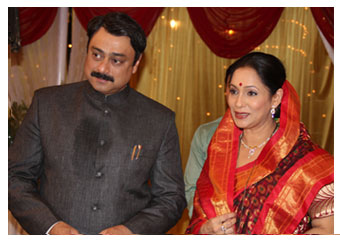
In the role of CM, Sachin Khedekar has proved that he is a versatile actor. Ashwini Bhave has played his wife’s role confidently, paying more attention on her perfect rural accent. Mahesh Manjrekar, playing the IAS cadre Secretary, looks a perfect match for this role. He finds an opportunity to display his frustration, when he encounters his own daughter( Poorva Pawar) rejecting the proposal of IAS fresher and expresses her desire to marry someone with strong political background. In the roles of other officers from Mantralaya, talented Pushkar Shrotri and Anand Ingale have played their parts very well. But, it is Rishikesh Joshi, in the role of CM’s Personal Secretary, steals the show. He has expressed his emotions very well, especially when he regrets his inability to return home that night, to greet his son, who has passed the Board exams with 92%.
Others in the supporting cast look very realistic. Music has limited scope in this film; but the classical song picturised on the blind Singer is good. Dialogues are well written with perfect sound and editing work. In short, ‘Aajcha Diwas Majha’ is the clash of Ego with conscience, when the person holding the highest post in Maharashtra Politics, realises his mistake and tries to recompense, going out of his way.The film is a tribute to Cinematographer late Rajan kothari, who has left his memories with his excellent photography in this film.
‘Tuhya Dharma Koncha?’- focuses on dilemma of Tribals
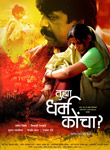 |
Rating: ★★★ ½
Producer: Abhay Gadgil, Shrirang Godbole, Mohan Damle Director: Satish Manwar Music: Dattaprasad Ranade Cinematography: Parixit Warrier Cast: Upendra Limaye, Vibhavari Deshpande, Kishore Kadam, Suhas Palshikar, Suhas Shirsat, Gauri Konge, Ramesh Medhekar, Shashank Shende Movie Review by: Ulhas Shirke |
God has no religion and therefore changing the God to offer prayers, does not change your religion. Latest released Marathi film ‘Tuhya Dharma Koncha?'(What is your religion?) tries to explain how poverty forces a poor family towards conversion to another religion and later goes on to show how the family has to face the ire from their own community. In fact, director Satish Manwar ( Gabhricha Paus fame) tries to explain the dilemma of tribals, who fall easy prey to opportunists and fanatics.
Set on the backdrop of a tiger sanctuary in Northern Maharashtra, the film revolves around a tribal family of Kavadu (Upendra Limaye) who lives in a small tribal colony with his wife Bhulabai (Vibhavari Deshpande) a small kid and a new born baby. One day, Kavadu is falsely implicated and put under trial for killing a tiger. In the absence of the bread earner in the family, Bhulabai becomes helpless when her new born baby needs immediate medical attention. She does visit the municipal dispensary at a nearby village; but can’t afford the costly food supplements prescribed. Later, when the child is seriously ill, on the suggestion of a lady from her tribe; she takes her son to a Father of a Christian missionary, who is a doctor. Indebted by the kind hearted Father and the Nun from the missionary, who offer her free treatment and food for her kid; Bhulabai regularly attends the mass at the church. She also gets converted into Christianity, only to face ire of local tribal community. Finally, Kavadu is declared innocent, as the real culprits are arrested. But, the a group of Hindu fanatics force Kavadu and few others from the village to get reconverted into Hinduism. Finally, Kavadu and his wife understand who their real God is, as they embrace a traditional tree in the last scene, to show their faith in Nature God.

The film does deal with a sensitive issue with utmost care, without hurting the sentiments of any religion. When the Father of the church (Kishore Kadam) tells the Nun (Sneha Majgaonkar) that he was not interested in keeping the count of number of conversions; but, would be happy to find even one such true devotee of his religion; it makes his selfless service very clear. At the same time, a Hindu priest, who is spreading the importance of his religion and showing his opposition to conversions; is himself shown against violence. It is only few of his devotees, lock him up and get involved into violent activities. As a result of their aggression, the poor tribal community is in a dilemma. The director has also shown the Naxalite movement in this region; and the reason for their taking up the arms. But, in the film’s screenplay, the director has shown them neutral, in the religious uproar. There is one possibility that some of the portion must have undergone cuts at the Censor’s table.
Director Satish Manwar has however presented his subject in a realistic manner. He has used the ahirani language very well throughout the film, which is a tribute to Bahinabai Chaudhary, whose all original poems were in this language. Cinematography by Parixit Warrier is simply superb. So is the suitable music score by Dattaprasad Ranade and background score by Augustine Samuel and the wonderful flute played by Navin Iyer from South. In the role of Kavadu, Upendra Limaye has given one more fabulous performance after ‘Jogwa’. Vibhavari Deshpande has supported him well, as a helpless wife. She has expressed herself very well at every situation through her eyes. In the role of Father of the church, Kishore Kadam is at his best. The dialogues are apt to every situation. The film does throw light on the existing situation in tribal region and shows how the Government’s apathy, enables external forces to exploit their poverty.
‘Dhating Dhingana’ offers old wine in a new bottle
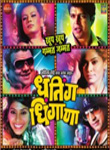 |
Rating: ★★ ½
Studio: Aaditya Production Producer: Aditya Dadhe Director: Mandar Devasthali Music: Ajay Atul Cinematography: Sanjay Jadhav Cast: Prasad Oak, Ankush Chowdhary Atul Parchure, Shweta Shinde, Aditi Sarandhar, Neelam Shirke, Anand Abhyankar, Arun Nalavade, Vandana Gupte, Smita Talwalkar, Uday Sabnis, Digamber Naik, Vidhyadhar Joshi, Suni Godse Movie Review by: Ulhas Shirke |
At a time when Marathi films are going for a change, with new subjects; some film makers still believe in following the traditional track of comedy, with nothing new to offer. There is no doubt that Feature films are a form of entertainment. But, the entertainment aspect should have such content which should keep the audience engaged from start to finish. Simply forming a big team of artistes and making them perform the scenes without the support of well presented screenplay, does not necessarily receive appreciation from the audience. Latest released film ‘Dhating Dhingana’ is one such film, which moves pointless; with foolish acts well suited to the title of the film; performed in rotation by different characters of the film.
Rahul( Ankush Choudhary) who is the most eligible bachelor, reads Superman Comic books and dreams of marrying a Girl, whose life is filled with adventures. His mother Snehal ( Vandana Gupte) wants him to marry her old friend Colonel’s (Late Anand Abhyankar’s) fashionable daughter Gauri( Aditi Saragdhar), who too is looking forward to marry a dashing young man.
So, to make his mother happy, Rahul calls Gauri over phone and asks her to come dressed up in modern clothes at a temple campus; so as to enable both of them to identify each other in a thrilling manner. But, Rahul mistakes Nisha, a pick pocket; for Gauri and Gauri is mistaken to be his relative by Devaa( Prasad Oak), who comes to Pune from Alibaug for a job in a bank .At the same time, Inspector Rasal( Atul Parchure) and his lady assistant inspector ( Shweta Shinde) are on a mission to arrest a gangster( Uday Sabnis) , who is expected to visit a bank, to deposit the stolen diamonds in the Bank’s locker.
It is almost at the same time a gang of Five short men plan to rob the bank. So, we find all the characters assembled inside the ABC bank. The gang of short men dressed up like Schoolboys enter the bank and manage to steal the money at Gunpoint; while the Police Inspector and his assistant are on duty outside the bank. Nisha manages to capture the bag from the Gangster almost around the same time and she flees along with Devaa; while Rahul is left in the company of Gauri. But, the Gangster lays a trap as witnessed in the old Bollywood films. Finally, they all unite together at Alibaug with the help of Police, to stop the Gang of short men and the Lamboo gang led by a Gangster, from running away to Dubai.
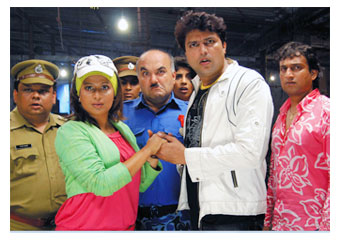
The film begins well, indicating that it would be a fantasy. But, as it progresses; the audience is subjected with foolish acts of different characters; which hardly make you laugh. Film literally drags till interval. The script is weak, especially in screenplay and dialogues. Mandar Deosthali’s direction is not impressive enough to create the desired humour, expected by sensible film lovers from him. Perhaps, the kids may enjoy some of the scenes.
The characters played by Vandana Gupte, Smita Talwalkar, Arun Nalawade, Vidyadhar Joshi, Savita Malpekar, Anand Abhyankar and Digambar Naik are just name sake in the film. The last two artistes are with their mask on, in the limited roles to their share. There were big expectations from Music directors Ajay Atul. But, there are just two songs; one of which is a Group performance, suited for title music at the end; but used at a wrong place.
The performances of Ankush Choudhary, Prasad Oak, Aditi Sarangdhar, Neelam Shirke, Atul Parchure and Shweta Shinde are satisfying; but, it gives an impression that they were performing on stage. Moreover, the film’s shooting seems to have taken place at least 3 to 4 years ago. The preparations for Commonwealth games in Pune is clearly noticed with proper upkeep of roads and the banners which are captured by Sanjay Jadhav’s neat and clean cinematography. Incidentally, Sanjay has also played a small cameo in this film. ‘Dhating Dhingana’ offers nothing different; but a typical situation based average comedy; in the form of old wine in a new bottle.
JMDB uses Punjabi Tadka for a Marathi recipe
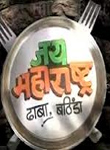 |
Rating: na
Producers: Atul Kamble and Avadhut Gupte Director: Avadhoot Gupte Music: Nilesh Moharir Cinematography: Rahul Jadhav Cast: Abhijit Khandkekar, Prarthana Behere, Vikram Gokhale, Punit Issar, Shuhangi Latkar, Priyadarshan Jadhav, Varun Vij, Monika Dabade, Ganesh Mayekar and Manreet Kaur. Movie Review by: Ulhas Shirke |
We have seen many Bollywood films using Punjabi tadka in their productions, which has resulted in offering a hit recipe to Hindi film lovers. Now, Avadhoot Gupte has played the same trick in his latest released film ‘Jai Maharashtra Dhaba Bathinda’ which has gone the DDLJ way. The film’s one liner tells you the story of a well to do Maharashtrian youngster, who goes all the way to Punjab to open a Dhaba, serving Maharashtrian food; only to accept the challenge thrown by a Punjabi hotelier in Maharashtra.
Having found the necessary ingredients for his recipe, the director has cooked up his screenplay in such a way that he could offer a taste with a difference to our traditional Marathi audience. The film revolves around a young man Sayaji Nimbalkar( Abhijeet Khandkekar) from Pune, who opens a Dhaba in Punjab and serves traditional Maharashtrian preparations.
He successfully celebrates 1st anniversary of his Dhaba, when he comes across a Punjabi Girl Jas( Prarthana Behere), who comes from Maharashtra, to attend wedding of her cousin.
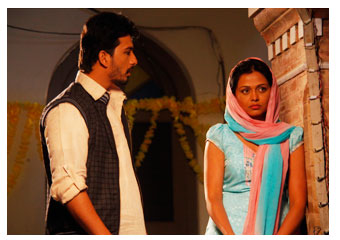
Sayaji, not only faces hurdles in his business from his Punjabi competitor in the neighborhood; but also in his love. The screenplay of the film does raise doubts in your mind, about the behaviour of the lead characters, with the progress of events; as certain scenes shown in flashback does confuse the audience. Everything becomes clear only in the climax, when Sayaji arrives with Jas in Pune; though some hints are given through few dialogues.
Director Avadhoot Gupte has used his skills well, to surprise the audience at the stroke of interval and during the concluding part of the film. But, what makes the film more appealing, is Rahul Jadhav’s excellent cinematography. Very intelligently, he has captured the fields of Punjab and other locations to get that real feel of small Punjab township. Even his aerial photography is so good that it reminds you of any Yash Chopra film, particularly DDLJ.
The choice of two television stars making their debut in lead roles in this Marathi film, was a right decision of the film maker; as both these artistes have given their best. Prathana Behere, the ‘Pavitra Rishta’ girl, looks stunning in many close up scenes. She has expressed very well, to match with many scenes, which kept the audience guessing her real identity. Playing the male lead, Abhijit Kahandkekar scores with his acting skills; though some of his action scenes are not convincing.
Vikram Gokhale plays his part with conviction, using his past experience to dominate those few scenes, he has to his share. But, Priyadarshan Jadhav is an attention grabber. Using all his skills of past stage performances, he has played the young Marathi speaking Sardar from Punjab very effectively. It is because of his presence, the film has offered light entertainment through his perfect body language. In the supporting cast Punit Issar, Shubhangi Latkar, Priyadharshan Jadhav, Varun Vij, Monika Dabade, Ganesh Mayekar, Manrit Kour have done a good job.
Music by Nilesh Mohrir is pleasing, in every situation based song played in the film. The film does pass a social message besides inspiring today’s Marathi youth to accept challenges in life to set up their own business anywhere in India. To fulfill the requirement of wholesome entertainment, ‘Jai Maharashtra Dhaba Bathinda’ has used Punjabi tadka for a Marathi recipe very well.
‘Ashach Eka Betavar’ takes you on a mystery filled journey
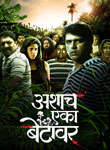 |
Rating: na
Banner: Srushti Films Producers: Leena Bala Nandgaonkar, Divakar Sawant, Javed Pathan Director: Sanju Hinge Music: Milind Joshi Cinematography: Raju K. G. Cast: Sanjay Narvekar, Ankush Chaudhari, Madhura Velankar-Satam, Sai Tamhankar, Sanjay Mone, Yatin Karyekar, Mangesh Desai, Sharad Ponkshe, Kamalesh Sawant, Punam Jadhav, Sharad Gadgil, Shreya Kadam, Dinesh Salvi, Vaishnavi Naik, Suresh Dol, Ram Budke, Archana Tendulkar, Sangeeta Sane, Hrishikesh Shastri, Sumit Mane, Vedang Patkar Movie Review by: Ulhas Shirke |
So many films have been made in the past, which were inspired by Agatha Christie’s best selling world famous novel- ‘And Then There Were None’, which had sold over 100 million copies. A film was also made with the same name, which was an adaptation of the novel. But, when a stage play was attempted in UK, with the name ‘Ten Little Niggers’; few changes were made in the script. The stage play continued in USA, thereafter, with the title ‘Ten Little Indians’.
In 1965, Raja Nawathe directed a Hindi film ‘Gumnam’, which was also inspired by this English stage play and not the original novel, as in the original novel, all the guests in the bungalow get killed and the man behind the killings, finally ends his life. Now, we find a new Marathi film, also inspired by the English play ‘Ten Little Indians’, which was also based on Agatha Christie’s creation. So, we find eight strangers coming together on an island to find their accommodation in a bungalow, surrounded by dense forest. They are welcomed by a Butler ( Sanjay Narvekar) and his wife ( Poonam Jadhav) who attend to them.
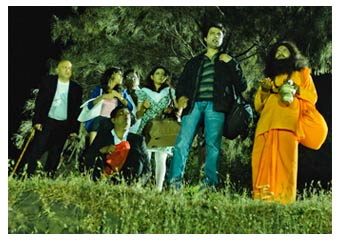
Ankush Choudhari, Ashach Eka BetawarDuring their first dinner itself, a recorded message accuses each one of them of the crimes committed by them. They all question the butler, asking him about the man behind the scene. When all of them are convinced that like them, even the Butler has been invited to serve them; they start suspecting each other. As the mystery remains, two of them are found murdered, one after the other, little before interval. Before that, the director takes time to narrate in brief the lifestyle of Mumbai through the voice of Nana Patekar, since all these people belong to Mumbai. He also takes you quickly into the flashback, showing the background of six of the guests, while they are travelling in an imported motor boat, on their way to the island.
At the stroke of interval, there are six guests left, besides the Butler and his wife. Aakash( Ankush Choudhary) and Ameeta (Madhura Velankar ) being treated as lead pair, come closer during this period; while the bar dancer Shabana( Sai Tamhankar) becomes the favourite of DD (Yatin karyekar). A doctor (Sanjay Mone) and a professional criminal ( Kamlesh Sawant) are looked upon as suspects, in this mysterious drama. As the screenplay progresses, you find at least two twists in the screenplay of this film; only to surprise you in the climax about the man behind the killings.
Chintan Mokashi’s screenplay possesses the required strength, to create the desired impact in this captivating murder mystery, which is new to Marathi cinema. His dialogues with Sanjay Pawar also create the combined effect of fear and humour, according to the changing situation. The character of Sanjay Narvekar has been cleverly used to nullify the continuous effect of terror. Director Sanju Hinge has done a brilliant job in generating anxiety after each murder sequence, for which he deserves compliments.
The background music and sound effects have been well paced in this film to generate curiosity at every stage, especially after interval. The film has only three songs composed by Milind Joshi, out of which two songs in Hindi are picturised on Shabana, during pre interval stage .The third one is played in the background, immediately after interval. Editing work by Kshitij Pavaskar and Abhijit Girulkar is good, compared to the Hindi version ‘Gumnam’ based on the adaptation of same play. The cinematography by Raju K.G. is very effective to create that desired impact, at every moment in the film.
Among the artistes, Ankush Choudhary, Madhura Velankar, Sai Tamhankar , Yatin karyekar, Sanjay Mone and Sanjay Narvekar find better scope to display their acting skills, at different situations. Kamlesh Sawant finds some scope in three scenes; but talented actors like Sharad Ponkshe and Mangesh Desai are treated like guest artistes in this film. The same is the case with Ponam Jadhav .
The plot in the film is gripping, though it has some resemblance to 1965 Bollywood film ‘Gumnam’; which is also inspired by Agatha Christie’s creation. The reason for the assembly of guests is different. By the way, the Bikini scene of Sai hasn’t been there in ‘Gumnam’, as the Bollywood actress Helen was shown in Mini skirt at the beach. One good thing is that, the makers of this film have admitted that they were inspired by Agatha Christie’s work. Now, how you give treatment to this subject in cinematic format, is all that important and makers of ‘Ashach Eka Betavar’ have succeeded in offering their best to Marathi film lovers. It’s a well presented murder mystery. Finally, what Agatha Christie had said, has a point here. “Every murderer is probably somebody’s old friend.”
‘Premachi Goshta’ defines love beyond relationship
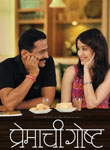 |
Rating: na
Banner: Mirah Entertainment Pvt. Ltd, Citrus Check Inns Producers: Ihita enterprises Director: Satish Rajwade Music: Avinash, Vishwajeet Cinematography: Suhas Gujrathi Cast: Atul Kulkarni, Sulekha Talwalkar, Sagarika Ghatage, Satish Rajwade, Rohini Hattangadi, Mira Velankar and Rani Gunaji (Guest Appearance) Movie Review by: Ulhas Shirke |
Steve Martin has rightly said, “Relationships end, but they don’t end your life. But people do often spend more time finding out about failed relationships than finding successful ones.” Perhaps, based on this philosophy, writer Chinmay Kelkar and director Satish Rajwade thought of making this new Marathi film ‘Premachi Goshta’. The rising cases of divorce among young middle class Maharashtrian people are on the rise and hence this subject is timely, to make a film.
The story of the film is about two strangers Ram Subramanyam ( Atul Kuklkarni), and Sonal ( Sagarika Ghatge), who happen to meet in a Family court. They start talking to each other after a misunderstanding and later get to know each other . For Ram, it is almost like understanding a woman, after meeting her in the family court.
Ram already has faced a divorce from Ragini( Sulekha Talwalkar) an aspiring model and stage actress, who is more concerned about her career and space. Though Ram is a good husband, Ragini’s over ambitious attitude, results in their divorce. On the other hand, Sonal has two failed marriages and is depressed. She lives with her single friend Meera( Meera Velankar) and desperately searches for a job. When Sonal faces an interview, to assist a script writer in his works, he happens to be Ram. In short, the world is too small for them, to meet once again.
Ram is born to a Maharashtrian mother and a south Indian father, hence Subramayam. But, in the film, he is shown only with his mother ( Rohini Hattangadi), who is more concerned about her son’s future. But, Sonal’s entry into his office, brings lady luck to Ram. Otherwise, believing in stories based on remakes of old hits with little changes here and there; Ram is encouraged by Sonal to write his original stories and it works. Ram also inspires Sonal to contribute something to his story and later gives her a free hand to proceed with the conclusion.
As the characters in their story take the form of A,B,C & D; the actual happenings in their life also take unusual turns, with the return of Ragini and Samit ( Sonal’s ex- husband). This brings a temporary halt to their work on script, with the difference of opinion between Ram and Sonal over conclusion part in the climax. Ram’s close friend Swaraj ( Satish Rajwade) suggests him not to entertain Ragini once again, no matter it was for professional work. Ram’s mother is also not happy with Ram’s professional relations with Ragini, whom she calls a selfish woman.
Director Satish Rajwade has handled this cinematic form of love story with his own creativity. Scenes of Ram and Sonal together in office and Cafe have been shot very well. “Love remains, though relationship ends” is all that he has tried to explain, through this sensible film. After ‘Mumbai-Pune-Mumbai’ this is another good creation from him. Though ‘Mumbai –Pune-Mumbai’ was targeted at youngsters and about making selection of life partners, ‘Premachi Goshta’ goes one step further to show that falling in love with each other is not enough for marriage; but it is understanding each other well, more important for a successful marriage.
In the role of Ram, Atul Kulkarni has played a simple idealistic hero, in search of happy relationship. He has displayed different shades through his performance, while expressing his emotions and conscience. A wonderful actor that he is, Atul has given full justice to his character. Sagarika Ghatge, plays a depressed and agitated woman in the initial stage; but quickly shows happiness through her emotions, while sharing her thoughts with her friend Meera. Sulekha Talwalkar, who has a long experience of playing a career woman in the recent past, has played her part well. Satish Rajwade , Meera Velankar & Ajay Purkar have offered good support, through their performances in equally important characters in this film. It was nice to see Rohini Hattangadi making a comeback into Marathi films, after a long time.
Lyrics of Ashwini Shende are meaningful in the songs played in the background, according to changing situations; on the music of Avinash Vishwajeet. Photography by Suhas Gujarathi is good, while capturing those required emotions of the main characters, in all those important scenes. Presented by Mirah Entertainment Pvt Ltd, ‘Premachi Goshata’ is not a routine love story; but, offers something different, to define love beyond relationship.
Devious ‘Pune52′ is a path breaking Marathi film
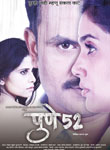 |
Rating: 2.5
Banner: IME Motion Pictures, Arbhaat Nirmitee Producers: Abhay Gadgil, Shrirang Godbole, Girish Kulkarni, Umesh Kulkarni Director: Nikhil Mahajan Music: Atif Afzal Cinematography: Jeremy Reagen Cast: Girish Kulkarni, Sonali Kulkarni Sr., Saie Tamhankar, Bharti Achrekar, Kiran Karmarkar, Shrikant Yadav, GP Deshpande, Swanand Kirkire Movie Review by: Ulhas Shirke |
Sir Arthur Conan Doyle created his fictional detective in the form of Sherlock Holmes. Now, Australia returned film maker Nikhil Mahajan has dared to create his Amar Apte as private detective in latest Marathi film ‘Pune 52’ in his own style. Moreover, as claimed in the credits, that the film is based on a true story, this film is expected to draw attention.
Set on the backdrop of early 90s, it is the story of a private detective Amar Apte (Girish Kulkarni) from Pune, who operates from his old house, in an adjacent room with a separate entrance. Amar sneaks into the personal lives of others, especially those adulterous wives, as part of his assignment. During one such assignment, he clicks a builder (Kiran Karmarkar)in his private acts ; who sends police to his house to recover the amount from his wife, for interfering into his personal life.
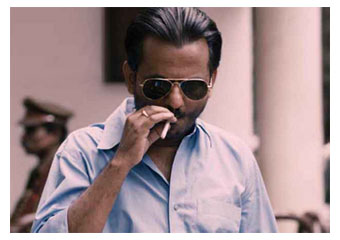
In comes, Neha, who introduces herself as the same Builder’s wife and hires Amar on an assignment. She even pays him advance. However, Amar, who is disturbed by his demanding wife Prachi (Sonali Kulkarni Sr.) gets trapped into Neha’s seductive nature. This has given ample scope to the film maker to show some hot intimate scenes between Amar and Neha. But, for filming these intimate scenes between Girish Kulkarni and Sai Tamhankar , the film has received ‘A’ certification. Obviously, this has invited the attention of Marathi audience; since not many youngsters below 18, are otherwise keen on watching Marathi films. Not a bad idea!
The pre- interval session of the film is bit slow, as the plot of the film doesn’t become clear till interval. It is only in post –interval stage , the film generates interest among the audience. It is a sincere effort by the director to incorporate twists and turns; which only the true film lovers are able to understand. Other wise, watching this film in a theatre, would also invite lewd remarks from a section of audience, on certain scenes; as witnessed by this critic in Movie Time- Hub, on the first day. The film is technically well made, with perfect sound effects & suitable background music by Atif Afzal. Wonderful cinematography by Jeremy Reagen from New Zealand, makes this film more appealing. Watch some of the scenes shot in dark and those in close up. It’s a remarkable work.
Girish Kulkarni finds a totally different kind of role through this film and he has given justice to his charater. Sonali Kulkarni finds a suitable role of his wife, who has cleverly shown quick change of behaviour in her character, as per the requirement of the script. Sai Tamhankar is at her best. She perfectly fits into the role of Neha. It was nice to see Kiran Karmarkar playing that intricate character of a builder, with ease. Bharati Achrekar plays a convincing mother in law of Amar Apte. Though there is a mention about Amar’s father-in-law, his appearance has been cleverly avoided.
To say something about the complex screenplay, few sluggish scenes should have been edited to make the film more interesting in the first part of the film. Otherwise, the film has turned out to be a devious path breaking film in Marathi. The English sub titles are expected to turn in favour of the film.
